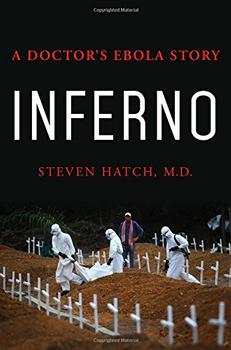Summary | Excerpt | Reviews | Beyond the Book | Readalikes | Genres & Themes | Author Bio

A Doctor's Ebola Story
by Steven Hatch
The screaming then took an even more ominous turn. In 1989, an animal quarantine facility in Reston, Virginia, noticed some crab-eating macaques from the Philippine island of Mindanao—more than seven thousand miles away from Sudan or the DRC—had come down with an unexplained serious illness. Under the eyes of the electron microscope, it had the hallmark spaghetti-like appearance of a filovirus, and the nonspecific antibodies against Ebola lit up, which must have come as a serious shock to the scientists involved. Moreover, the disease was spreading inside the facility, as macaques from different shipments began to fall ill. This strongly implicated that the pathogen wasn't transmitting through direct creature-to-creature contact, as had all previous accounts of Ebola transmission.
You couldn't have scripted a more unsettling scenario: Not only had one of the world's deadliest viruses nestled itself into the United States, it was an airborne strain of the disease. And it was within a half hour's drive of the nation's capital. Because of this, several years later, when Richard Preston penned The Hot Zone in 1995, very little needed to be exaggerated for the book to live up to its subtitle: A Terrifying True Story. The core story of the Reston outbreak in the hands of a masterful writer such as Preston quickly turned The Hot Zone into an international best seller, and Ebola captured the popular imagination. At almost the same time, a more comprehensive and scholarly consideration of the subject of emerging infectious diseases (of which Ebola was one small chapter) had come out, and Laurie Garrett's The Coming Plague also catapulted to fame.
The only good news from the 1989 Reston outbreak was that it appeared not to cause disease in humans, as a half dozen of the workers involved in the incident were found to have antibody responses to the virus, even though they never became ill. The more sobering news, which wasn't much emphasized in The Hot Zone, was that the Reston Ebolavirus could be found almost halfway around the world from the previous outbreaks, and in a place where the citizenry travels much farther and with much greater frequency. It indicated there were biological threats out there of which we were only dimly aware, and they were capable of exploiting ways in which humanity was organized in the late twentieth century that might, at its worst, threaten civilization itself.
The release of The Hot Zone and The Coming Plague in 1995 couldn't have been more serendipitous, for in that year perhaps the scariest of Ebola outbreaks until then took place, when the virus made its first truly urban appearance in Kikwit, a city of around two hundred thousand people in the country then called Zaire. As with the initial outbreaks, more than three hundred people became infected; the case fatality rate was 80 percent. But the Kikwit outbreak did more than just boost sales and make publishers happy, for it got people thinking about what might happen if Ebola was discovered in a truly large African city—say, of one or two million people. Those cities, of course, have airports with international destinations. And by the late 1990s Africans were traveling more and more, and to every corner of the world.
* * *
Emile Ouamouno fell ill in late December 2013.2 Nobody knows what his precise symptoms were because hardly anyone who cared for him is left alive. He had a fever and may have had a headache. He reportedly had bloody diarrhea. Of course, dozens of diseases can cause bloody diarrhea, all of them considerably more common than Ebola, which had not been seen before in Guinea. This is a book about Ebola, but it is worth pointing out that infectious diarrhea remains among the biggest killers of children under the age of five in this part of the world. Baby Emile was much more likely to have rotavirus, enterohemorrhagic E. coli, non-typhoidal Salmonella, or Campylobacter, among many other organisms, than anything so exotic as Ebola. The global health community has made considerable progress in preventing such deaths, cutting the mortality rate in half over the past fifteen years. It's actually a great story that should be told to the public. Yet, despite this uplifting advance, more than half a million children annually still die of this largely preventable and treatable condition, which is virtually unheard of in the West.
Excerpted from Inferno by Steven Hatch. Copyright © 2017 by Steven Hatch. Excerpted by permission of St. Martin's Press. All rights reserved. No part of this excerpt may be reproduced or reprinted without permission in writing from the publisher.
Your guide toexceptional books
BookBrowse seeks out and recommends the best in contemporary fiction and nonfiction—books that not only engage and entertain but also deepen our understanding of ourselves and the world around us.